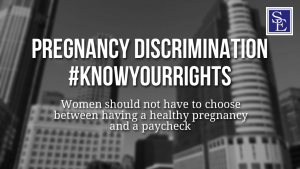An Essex County New Jersey Superior Court judge has issued an opinion that held that a Professional Employer Organization (also known as PEO) can be considered a co-employer for the purposes of the state’s Law Against Discrimination. In the case, Stephanie Perez sued not only her W-2 employer, the Dermatology Group, P.C., but also their designated PEOs, ADP TotalSource II, Inc. and ADP, LLC t/a ADP Major, for claims of pregnancy discrimination, failure to reasonably accommodate and unlawful retaliation. This is an important development in how New Jersey courts are treating the relationship between employees, their primary employers, and PEOs.
PEOs are organizations that provide support services, including human resources services, to companies. Typically, PEOs provide such services to small and medium sized companies that do not have internal staff committed to providing such services. Over the past 40 years, PEOs have become a substantial segment of the national employment landscape. According to statistics reported by the National Association of Professional Employer Organizations (“NAPEO”), there are now over 907 PEOs operating in the United States providing services to 175,000 small and medium-sized businesses, which in turn employ approximately 3,700,000 employees nationwide.
Often, PEOs are designated as the W-2 employer or act in a capacity of being a co-employer with an employee’s primary employer. As NAPEO acknowledges, PEOs typically work alongside the primary employer and “both parties might share responsibility for [certain] obligations and be ‘an’ employer” in the context of the performance of those obligations. Because many PEO’s provide advice and counsel on employment law related policies as part of their services, issues arise when that advice or counsel is wrong and plays a determinative factor in causing an unlawful termination.
In this particular matter, Plaintiff Stephanie Perez has alleged pregnancy discrimination against her primary employer and the two Defendant PEOs, ADP TotalSource II, Inc. and ADP, LLC t/a ADP Major Accounts. Plaintiff was terminated from her employment in mid-2018 following her need for pregnancy leave.
Defendant PEO ADP TotalSource filed a motion for summary judgment to be relieved of any potential liability with respect to the plaintiff’s discrimination claims. The defendant PEO ADP TotalSource argued that because its contract had been terminated by the primary employer at the end of 2017, as a matter of law it was not liable for any alleged discrimination. In denying the PEO’s motion, Superior Court Judge Keith E. Lynott, J.S.C., found that there was some evidence of the PEO’s involvement in the primary employer’s termination of the plaintiff’s employment, despite the primary employer severing its contract with the PEO prior to the termination.
Some of the factors the Court considered in reaching its decision were that the PEO was explicitly named as the plaintiff’s employer on her 2017 W-2 statement, and the PEO was identified and referenced throughout the primary employer’s employment manual as a human resource contact. Further, when the plaintiff announced her pregnancy in 2017, the PEO was still assisting the primary employer and it is unknown what role, if any, the defendant PEO played in any decision-making process concerning the plaintiff’s employment status.
The plaintiff argued that the PEO must be required to provide discovery to determine what role if any they played in the termination. The PEO may have been integral to the Company’s decision to permit the plaintiff only two (2) weeks of leave to give birth and recover therefrom. Further, the PEO was involved in fashioning and implementing the employment manual which set forth the Company’s leave policies. The plaintiff argued that summary judgment finding the PEO had no liability for the pregnancy discrimination she suffered was inappropriate prior to completion of discovery, as it is necessary to develop any facts establishing the PEO’s involvement in active discrimination while engaged as the PEO.
Ultimately, the Court agreed that the defendant PEO’s motion was premature and that additional discovery was necessary. Judge Lynott’s Opinion further stated that it is quite possible the PEO played a material role in the decision-making with respect to the plaintiff’s employment status. The Court also found it conceivable that, prior to the severance of their relationship with the primary employer, the PEO had determined and/or influenced the manner in which the primary employer addressed the plaintiff’s request for pregnancy leave and her related request for accommodations.
The Court found that the “record reflects a sufficient basis for a trier of the facts to conclude that, during 2017, that [the PEO] was a co-employer of [Plaintiff’s] for purposes of applying the Law Against Discrimination.” Accordingly, the Court denied the PEO’s motion and allowed discovery to proceed. Link to Order and Decision:
This decision appropriately elevates substance over form, showing that a PEO will be held responsible for their conduct, regardless of the status of their relationship with the primary employer. This is in line not only with common sense, but with NAPEO’s position on this issue: “PEOs create a real relationship with worksite employees over certain matters. This relationship exists in fact, not just in form.” Judge Lynott’s decision in this case recognizes this reality, and allows the plaintiff the opportunity to determine if the defendant PEO was involved in the pregnancy discrimination she suffered.
 New Jersey Employment Lawyers Blog
New Jersey Employment Lawyers Blog


